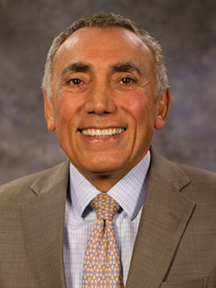In light of Europe's migrant crisis, many questions about current Syrian immigration systems within the EU are obviously on the table. The issue is parallel and, in many ways unrelated, to the IS stronghold within European cities. However, the recent attacks within Europe need to be understood as being a second-generation European issue as they are an Islamic State and Syrian issue.
A mainstay of ISIS' hope is to create an Armageddon n between the West and Islam. It prospers from the notion of "two camps" that George Bush spoke of after 9/11/01 being very separate. "You are either with us or you are with the terrorists." If being, "with us" is unbearable, wouldn't joining the Islamic State be attractive? If the grey zone between the two camps will soon disappear, and when Western societies vehemently turn against their own Muslim citizens, ISIS's prayers are answered. If such a backlash within their own country occurred, downtrodden and marginalized European Muslims would be convinced quickly that the world hates them and their religion, and they would run to join ISIS with open arms.
Islamaphobia is decades-old in Europe, and the majority of Muslims there have
suffered the effects. Rights and abilities to attain jobs, houses, religious
ceremony, and essential schooling that most other Europeans expect without
question are surreptitiously kept from Muslims. Amnesty International has
concluded that most other Europeans do not approve of Muslim women wearing
their headscarves in public, at school, on the job, or of mosques being built
even though the demand for religious spaces is present. In the last two
decades, parties promoting
Islamaphobic sentiment have had electoral success to shine in the national
parliaments of many European countries including Austria, Belgium, Denmark,
France, Italy, the Netherlands, Norway and Switzerland. Their political sentiments
are not only aimed at halting immigration, but establishing mandatory
integration criteria for migrants and reducing the influence of Islam. Twenty
and thirty-something Muslims in Europe have every right to feel attacked. Their
parents' hard work and positive intentions toward a better life in a supposedly
better place have been undoubtedly been thwarted.
For immigrants, cultural integration isn't easy. There will undoubtedly be disaffected, underemployed masses. Add a twist of strong religious beliefs, robust social media usage, and political upheaval and extremism can successfully make its plea and take hold. Especially when involving passionate, young, aimless, and frustrated citizens. Thus, most of the identified jhihadists from the Paris attacks were young Europeans-born to hard-working parents who immigrated throughout the 70's and 80's. Of the nine currently identified Paris attackers, seven were EU nationals. Mostly Belgian or French. They were "well-behaved, sweet, and unassuming" members of their neighborhoods, working on trains and in bars. They were, on the surface, normal men, whose neighbors never had any reason to raise an eyebrow. France had been a vocal opponent of Bashar al-Assad during the Syrian civil war, and France's support for Syrian rebel groups can be assumed to have contributed to the spread of terrorism. IS is losing territory within Syria, but by gaining the sympathy of outsiders, they have the illusion of being extremely all-encompassing and hugely powerful.
What are IS extremists searching for within their pool of could-be followers? On the wish list are: Islamic puritanism, economically-marginalized citizens who may also struggle with unemployment, those who feel discriminated against, and psychologically or socially withdrawn individuals who have personal reasons to search for a more powerful identity. Molenbeek, Belgium is a jihadist hot spot, simply by the nature of its demographics and geography. It is believed that most weapons used in terror attacks in Europe come through Belgium. It lies in the heart of the Schengen zone, which is a border-free arena ripe for hiding and trafficking. The country has the highest proportion of EU citizens going to join IS in Syria. Blamed for this in many ways are Belgian government and security services, which are a weak link.
It may have been convenient for Islamic State fanatics to live comfortably in Belgium while planning their attacks on nearby France. While one of their popular mottos is to "endure and expand," Europe's social policies and open society offers the perfect climate for IS sympathizers to expand in. Arguably, Europe could be a more temperate environment for the extremists than disembodied Syria, where resources are limited. IS affiliates consist of 36 groups around the world which declare allegiance to its shadowy caliph Abu Bakr al-Baghdadi.
As it stands, Europe is asking itself boat loads of questions. Jean-Claude Junker, the President of the European Commission, has rejected suggestions to rethink the EU's policy on migration and certain open borders. Changing and strengthening the Schengen area border rules could take months at least, if it is decided to do so. EU ministers, of course, have expressed the desire to begin stronger controls in order to adapt to a more dangerous world. Of course, however, free and open societies need to be defended in order for the rest of humanity to thrive.
Does Holland's declaration of war fall into this trap that ISIS has undeniably
layered out, within an area already so unhospitable? Unauthorized house
arrests and unwarranted police raids for at least the next three months in the
EU are examples of an acerbic, unhospitable reaction. Law-abiding Muslim
citizens are finding it difficult to carry on with their jobs and home lives,
as they are required to check in with police four times a day.
Holland's quick move to the right are playing into the hands of the ISIS
propaganda, and erasing the grey zone at an alarming pace.
**Dr. Fariborz Ghadar is founding director of The Center for Global Business Studies at Penn State's Smeal College of Business and a senior adviser at the Center for Strategic and International Studies. He is author of the book Becoming American: Why Immigration is Good for Our Nation's Future. Follow him on Twitter @FGhadar
"





